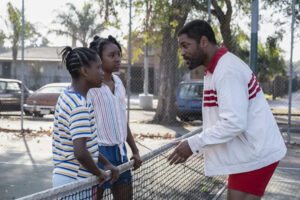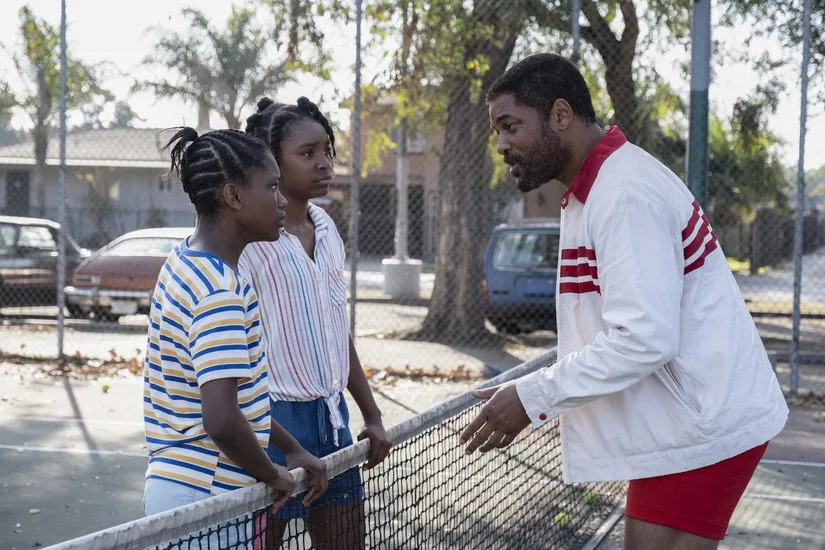King Richard
Posted on November 18, 2021 at 5:00 pm
B +| Lowest Recommended Age: | Middle School |
| MPAA Rating: | Rated PG-13 for violence, strong language, a sexual reference and brief drug references. |
| Profanity: | Strong language |
| Alcohol/ Drugs: | Drug references, alcohol |
| Violence/ Scariness: | Some violence including a drive-by shooting and assaults |
| Diversity Issues: | A theme of the movie |
| Date Released to Theaters: | November 17, 2021 |
| Date Released to DVD: | February 7, 2022 |

Will Smith plays Richard Williams, and as he did in “The Pursuit of Happyness,” playing another real-life devoted and determined father, he gives a complex, layered performance. He makes it clear that Richard’s determination is as much the result of trauma as of ambition, as much the result of frustration and resentment over the opportunities he did not have as of his commitment to making sure his daughters had opportunities, especially opportunities no one else thinks are possible.
Actors, like tennis doubles partners, need to be a team, and Aunjanue Ellis as the girls’ mother Oracene ‘Brandy’ Williams matches Smith at every turn, just as Oracene was a full partner in parenting and coaching their daughters. Their scenes together show us a deep and sometimes difficult connection, whether she is comforting him as she treats his wounds or confronting him about his failings.
We have all seen a lot of biopics, and they don’t make movies about real-life characters unless they did something big and important. And that is why those films always have some scene where the main character is either being pushed to succeed and another where he or she is being tearfully accused of neglecting an important relationship. This film is unusual because the girls, including their three older sisters (one of whom, Isha Price, also served as a producer of the film) never complain about the training and practices, even in the pouring rain. Richard is supporting them as much as he is leading them. The scenes of the family together, in their tiny Compton home or riding in the family van, are — the only word that applies is joyful. Richard and Oracene are dedicated to excellence in school and in tennis but it is clear that what matters most to them is giving their girls good values and the skills and confidence to achieve whatever they want.
Saniyya Sidney and Demi Singleton are excellent as the younger Venus and Serena, and there are solid supporting performances from everyone else in the cast including the young girls who play the other Williams sisters and the older girls who play Venus and Serena in the later part of the film. Tony Goldwyn as the taciturn Paul Cohen, a coach who agrees to take on Venus but not her younger sister, and Jon Bernthal as the more excitable Rick Macci, who brings the whole family to his training compound and puts Richard on the payroll for a percentage of the girls’ future earnings.
Smith says that seeing the video of Richard Williams protecting then-14-year-old Venus from an intrusive reporter — and the look of pride and relief on her face, the confidence that he would always have her back — had an enormous impact on his notion of what it means to be a parent. It inspired him to be both a protector and a supporter of his children’s ambitions.
Smith does not go for the easy win here. He tones down his endless charm and screen charisma and tendency to charm to let Richard shine through. In his sensitive performance, we see that Richard is damaged and vulnerable. He knows he is dealing with people who are unimaginably more powerful than he is and that they will find his manner and appearance discomfiting. These are people who like being comfortable. He knows he does not have the luxury of getting angry when they open doors he knows his daughters deserve to go through. He is insistent, not confrontational, and always polite, though he knows that holding back is demeaning and unfair. “You’re wrong but I won’t hold that against you,” he smiles, and it is a Richard smile, not a Smith megawatt grin.
Like all champions, he keeps his eye on the ball and he leads with his strengths. He did something even more important and even more difficult than raising “two Mozarts” — he raised daughters who love him enough to want the world to see him the way they do.
Parents should know that this film includes some strong language, drug references and alcohol, sexual references that are crude and predatory, and some violence, with assaults and a drive-by shooting, and some family conflict.
Family discussion: Would you want to be part of this family? What would be in your 78-page plan?
If you like this, try: “Venus and Serena,” an excellent documentary


